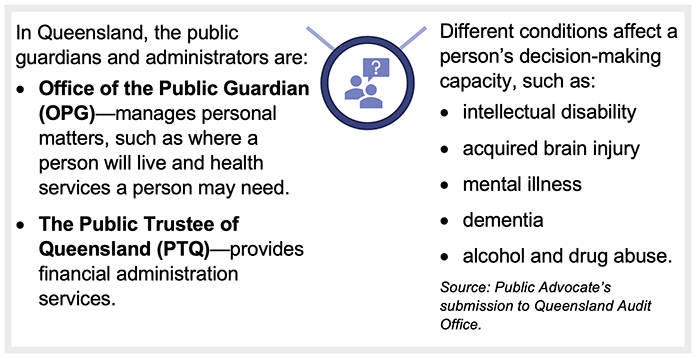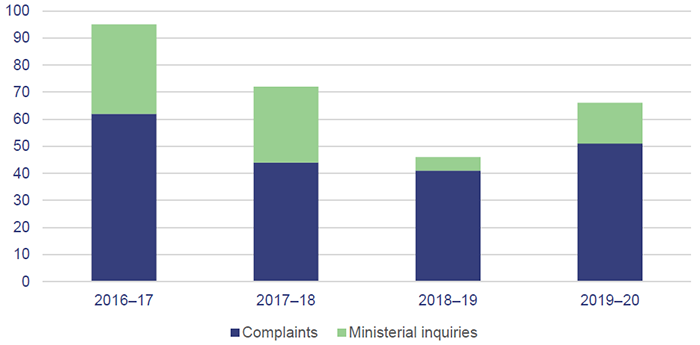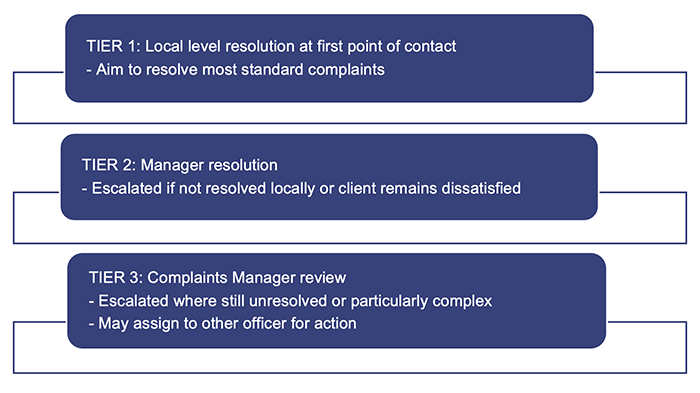Overview
The Queensland guardianship and administration system helps adults with impaired decision-making capacity manage their personal and financial matters. Every organisation that deals with the public will receive complaints, however it can be difficult for adults with impaired decision-making capacity to raise issues. Therefore, complaints management in the guardianship and administration system needs to be well designed and effective.
Tabled 16 February 2021.

Auditor-General’s foreword
This is my second report on how the Queensland guardianship and administration system responds to complaints from adults with impaired decision-making capacity. I tabled my findings on the Public Trustee in September 2020. This report focuses on the Office of the Public Guardian.
I found that neither the Office of the Public Guardian nor the Public Trustee of Queensland had properly designed their complaints management systems for people with impaired capacity. Their systems are not easy enough to understand or navigate. This could limit people’s ability to make a complaint. Neither entity had evaluated their complaints management systems to see if they met client needs and expectations.
Many public sector entities play different roles in protecting adults with impaired capacity. It should be easy for people to understand how and where to make a complaint, but it is not. The various systems and points of access to government services make it confusing, unclear, and complex to navigate.
The entity-based structure of government, organised around systems and processes, creates issues across all stakeholder groups on how to effectively access the services they need. For people with impaired capacity, who to contact to get help is even more difficult. While creating a ‘connected government’ is a significant challenge for the public sector, a more citizen-centric approach is needed to make it easier for these vulnerable Queenslanders to get help and information.
Brendan Worrall
Auditor-General

About this audit
What is Queensland’s guardianship and administration system?
The Queensland guardianship and administration system helps adults with impaired decision-making capacity manage their personal and financial matters.
Impaired decision-making capacity means a person cannot:
- understand the facts and choices involved
- weigh up the consequences of a decision
- communicate the decision.
The Queensland Civil and Administrative Tribunal (QCAT) appoints guardians and administrators as substitute decision-makers for adults with impaired decision-making capacity.

What is complaints management?
Complaints management means resolving complaints and identifying opportunities to make systemic improvements in service. Every organisation that deals with the public will receive complaints. The community expects government organisations to respond helpfully and quickly to the needs of the people they serve.
It should be easy for people to understand how and where to make a complaint about the guardianship and administration system. Everyone should receive advice and support when they make a complaint.
Good complaints management involves:
- receiving—making it easy for people to make a complaint
- recording—keeping records of each complaint received, action taken, decisions made and the result
- responding—promptly letting people know their complaint was received, handling the complaint, and keeping the complainant informed
- reporting—measuring performance, being accountable and identifying trends—so that anyone can see how well the government is responding to complaints and solving problems.
Our audit
We looked at how well Queensland’s guardianship and administration system manages complaints to improve the protection of adults with impaired decision-making capacity.
We reported our findings in two parts. We reported our findings on the Public Trustee (Part 1) on 24 September 2020. This report (Part 2) looks at managing complaints in the guardianship system and whether the Office of the Public Guardian:
- has effective systems and processes to receive, manage and review complaints
- responds to complaints on time
- reviews the effectiveness of its complaint management system and process to make improvements.
Appendix B has further details on the audit scope, including what we did not cover in this audit.

1. What we found
How quickly does the Public Guardian respond to complaints? |
- The Office of the Public Guardian (OPG) reports on the number of complaints resolved within and outside of target time frames. However, data errors mean there is a risk that OPG’s complaints reports are inaccurate.
- OPG does not sufficiently measure or report actual response times for complaints, or trends over time.
- Our analysis of complaints data for 2019–20 found that 36 per cent of complaints were not resolved within target time frames. However, we had to exclude almost a third of complaints from our analysis due to poor data.
- Poor response times can reduce customer confidence in how OPG handles and responds to complaints. This could discourage people from making further complaints.
Is the complaints management system easy to use for people with impaired capacity? |
- OPG’s complaints management system is not properly designed for people with impaired capacity.
- It is not easy for clients to understand or navigate the system. This could limit their ability to make a complaint.
- Information is only available in text—it is not written in Easy English or supported by pictures to explain concepts.
- OPG does not offer other options to help those with impaired capacity or disability—such as video or audio.
Does OPG have sound processes and practices to manage complaints? |
- OPG has proper complaints management policies and procedures but they could be written more clearly.
- OPG has a complaints handling process that follows good practice and an information technology (IT) complaints management system that is fit for purpose.
- But staff are not following the process properly or using the system consistently, which is leading to poor record keeping and poor data.
- This makes it difficult to assess if OPG is managing complaints effectively.
- Staff need clearer guidance on how to receive, record, respond to, and report on complaints.
Are staff well trained in complaints management? |
- Staff receive some complaints management training, but they need more support and specific guidance on the complaints management process.
Does OPG assess whether its complaints management is effective? |
- OPG does not know if its complaints management system is meeting the needs of its clients and the business because it has not formally evaluated its effectiveness.
- OPG does not seek feedback from clients about its handling of complaints. Therefore, it does not know how easy the system is to use or where it can be improved.
Are insights from complaints used to improve service? |
- OPG’s complaints data is not good enough to analyse how well its systems and processes work.
- OPG has recently developed a complaints management focus report that includes observations and learnings. While the report suggested some improvements, there was no formal action plan or evidence that changes had occurred.
Our recommendations |
We made six recommendations to:
- make it easier to complain to the Office of the Public Guardian
- improve OPG’s record keeping so that it can more accurately measure and report on its performance in resolving complaints, and use this information to inform system improvements.
Further detail on our recommendations is in Chapter 2.
Our conclusions
OPG could improve how it protects adults with impaired decision‑making capacity by making it easier for them to make a complaint and understand the system. The limitations in OPG’s complaints management system present barriers, which could prevent people from making a complaint.
Poor record keeping means that OPG is not effectively capturing and managing complaints information. This prevents accurate and complete complaints reporting. It makes it difficult for OPG to review the effectiveness of its complaint management system and processes to make improvements.

2. Recommendations
|
We recommend that the Office of the Public Guardian (OPG): |
1. measures and monitors complaint response times and reports regularly on how many complaints are finalised within target time frames
2. makes its complaints management system easier to use, by
- making information clear and easy to understand with alternative language or using video, audio, or graphics
- offering an online complaint form
3. makes the Complaints Management Policy and Procedure easier to understand
4. ensures all complaints received are recorded accurately and on time, including complaints received and resolved at a local level.
To do this, OPG should
- clearly define all data fields in the complaints management system so that staff understand their use and purpose
- provide staff with specific guidance and training on recognising and assessing complaints, and recording them in the system
- carry out quality assurance checks and record the results, to make sure staff manage complaints appropriately and record the complaint accurately
5. improve complaints management training and support for staff including
- targeted training in handling complaints from clients with impaired decision-making capacity
- finalising and implementing its internal complaints management procedure to provide staff with better guidance and support
- reviewing training effectiveness to ensure it meets both organisational and staff needs
6. improves system and process effectiveness, by
- seeking client feedback on complaints handling
- developing better data to identify issues and to inform improvement
- measuring and reporting on performance.
Reference to comments
In accordance with s. 64 of the Auditor-General Act 2009, we provided a copy of this report to the Office of the Public Guardian. In reaching our conclusions, we considered its views and represented them to the extent we deemed relevant and fair. Any formal response from the agency is at Appendix A.

3. Detailed findings—Being responsive and accessible
Background
It is difficult for adults with impaired decision-making capacity to raise issues, so complaints management in the guardianship and administration system needs to be well designed.
A good complaints management system should:
- acknowledge and respond to complaints in a timely and fair manner
- recognise the needs and expectations of people who complain
- be easy to find, access, understand and use.
Response times are not accurately measured and monitored |
The Office of the Public Guardian (OPG) reports on the number of complaints resolved within and outside of target time frames. However, data integrity issues prevent accurate measurement and reporting of complaints. It is likely that these reports are incorrect.
While OPG sets target time frames for different types of complaints, it does not measure or report the actual response times. Nor does it report trends over time.
Our analysis of complaints data for 2019–20 found that OPG responded late to about one third of complaints.
Delays in responding to complaints can lead to a loss of customer confidence in how OPG handles and responds to complaints. This could discourage people from making further complaints.
OPG sets target response time frames
OPG has set response time frames for acknowledging and responding to complaints in its complaints management policy.
OPG rates complaints received, based on complexity and risk, as either standard or complex. More time is given to responding to complex complaints. Target time frames are also longer if the complaint is escalated to a more senior person to handle.
The time frames set for acknowledging complaints are comparable with similar organisations in other states, although target response times are generally longer.
OPG does not meet all response time frames
OPG does not sufficiently measure or report on response times for resolving complaints received. Therefore, it does not know if it is meeting response time frames set out in its complaints management policy.
QAO analysis of response time frames
We analysed OPG’s complaints data to assess whether it is meeting target time frames. But poor data meant we had to go back to other records to check the information.
Even then we had to exclude 30 per cent of the 51 complaints received in 2019–20 because of data errors.
Of the remaining 36 records, we found that:
- 36 per cent of complaints in 2019–20 were not resolved within target time frames
- of the 13 late responses, seven were more than 20 business days late, with one of those more than 60 business days late.
Figure 3A shows the number and proportion of complaints not meeting target time frames.
|
Complaint type |
Total number of complaints |
Number resolved within target time frame |
Number exceeding target time frame |
Proportion of complaints not resolved in target time frame |
|---|---|---|---|---|
|
Standard |
24 |
14 |
10 |
42% |
|
Complex |
12 |
9 |
3 |
25% |
|
Total |
36 |
23 |
13 |
36% |
Note: OPG receives complaints about other parts of its business. The complaint numbers reported above relate only to adult guardianship services.
Queensland Audit Office analysis using the Office of the Public Guardian’s complaints management data and records.
Our analysis shows the value of measuring and reporting on performance. It would help OPG to monitor and report on the efficiency and effectiveness of its complaints management. It would also help identify systemic issues, trends, and areas for improvement.
|
Recommendation The Office of the Public Guardian measures and monitors complaint response times and reports regularly on how many complaints are finalised within target time frames. |
The complaints management system should be easier to use |
|
Making a complaint Everyone has a right to make a complaint as a consumer. The system should be easy to understand and access. |
OPG has the basic elements in place for a complaints management system. However, it has not designed the system to assist adults with impaired decision-making capacity to make a complaint.
Making a complaint is not easy for some people
OPG offers traditional methods to lodge a complaint—in person, by phone (including a toll-free number) or in writing (by email, letter, or online enquiry).
OPG accepts complaints from family members, friends, agents, advocates, or others who act on behalf of, or support, a person. OPG staff can also lodge a complaint on another person's behalf that is made to them verbally or in person.
While OPG advised that most complaints are raised by family members of its clients, OPG does not offer other options to easily help those with impaired capacity, such as an online complaint form to guide a complainant through the process. A form could prompt the complainant to provide the right information OPG needs to assess the complaint.
OPG offers some support to people with speech or hearing difficulties or people who do not speak English to make a complaint, but only by directing the person to another organisation to help.
Important information should be easy to find. The home page on the OPG website includes a link to compliments and complaints, but it is not easy to navigate—users must scroll down through text to find out how to make a complaint.
Information needs to be clearer
The OPG website has information on how to lodge a complaint and what an individual can reasonably expect to happen if they choose to do so. It is generally clear and written in plain English. However, it is only available in text. Information in this format may have little value for some individuals, particularly those with visual impairment, or language or literacy difficulties.
Information is not supported by other language or display options, such as video, audio, graphics, or Easy English to ensure adults with impaired capacity can easily understand the information.
|
Recommendation The Office of the Public Guardian makes its complaints management system easier to use, by:
|

4. Detailed findings—Having an effective system
Background
A complaints management system includes all policies, procedures, processes, staff, and technology. It covers the receiving, recording, responding to, and reporting about complaints.
An effective complaints management system should:
- have sound policies, procedures, and information systems to manage complaints
- have enough suitably trained staff to deal with the complaints
- provide information to analyse complaints and review the effectiveness of the complaints management system to make improvements.
Complaints are a valuable source of information on what is and what is not working within the Office of the Public Guardian’s (OPG's) programs and services. Regular analysis of complaints data can help to identify trends, systemic issues, and potential weaknesses, and to improve services.
Number of complaints received by the Office of the Public Guardian
Figure 4A shows the number of complaints recorded by the OPG about the adult guardianship services it provides. They are broken down by complaint type for the last four years.

Note: Number of complaints and ministerial inquiries is based on validated data available at the time of the audit.
Queensland Audit Office using data from the Office of the Public Guardian’s complaints management system.
The number of complaints in 2018–19 decreased by 36 per cent compared to 2017–18. This decrease does not align with:
- the trend across the other years
- an increase of 207 adults (six per cent) under the Public Guardian’s guardianship from 2017–18 to 2018–19.
Discussion with management indicates this decrease in 2018–19 is due to poor record keeping, rather than to a reduction in the actual number of complaints received. Management is taking active steps to identify missing complaints and improve record keeping standards. To date, OPG has identified a further nine ministerial inquiries that should have been recorded in its complaints management information technology (IT) system in 2018–19.
Complaints management processes and practices need improving |
OPG has designed its complaints handling processes in line with good practice and has an IT complaints management system that is fit for purpose.
But staff are not following processes or using the system consistently, which is leading to poor record keeping.
The lack of accurately recorded information makes it difficult to assess if OPG is managing complaints effectively.
Policies and procedures are suitable
OPG has appropriate complaints management policies and procedures. The Complaints Management Policy and Procedure is available to the public. However, it could be written and presented more clearly. This would help people with impaired capacity to easily recognise when they have grounds for making a complaint and to understand how the complaints process works.
|
Recommendation The Office of the Public Guardian makes the Complaints Management Policy and Procedure easier to understand. |
Staff need clearer guidance on handling complaints
OPG has a well-designed complaints management process. However, staff are not following the process consistently. They need clearer guidance on how to receive, record, respond to and report on complaints.
An informal quality assurance process exists to check if a complaint is handled and resolved correctly and in line with the Complaints Management Policy and Procedure. However, no records are kept of the complaints reviewed, any issues found, or follow-up action taken.
Figure 4B outlines the three levels of review in OPG’s complaints management process.

Queensland Audit Office based on the Office of the Public Guardian's Complaints Management Policy and Procedure.
OPG aims to resolve most complaints at the first level of complaints management—local level complaint handling with early resolution.
The level or tier at which a complaint is handled is not recorded in the complaints management system. Therefore, OPG does not know how many complaints are escalated or handled at each level.
Staff lack specific guidance on how to recognise when a client enquiry or communication should be dealt with as a complaint and recorded as one in the system. If a complaint is made directly to guardianship staff and can be resolved easily (Tier 1 Local level resolution at first point of contact), these are often not recorded as complaints in the system.
OPG also does not have criteria to assess the complexity of a complaint or when to escalate to another officer.
Complaints management IT system is not used consistently
OPG’s complaints management IT system is designed to manage complaints, but OPG is not using it consistently enough to manage complaints well.
Staff do not always record the right information in the right place. This is because they have not been given clear guidance on what to record. For example, there are multiple date fields in the complaints management system, but it is not always clear which one should be used for what purpose. This makes it difficult to work out response times.
Data errors have led to inaccurate reporting
Not collecting complaints information accurately and completely means that OPG cannot effectively:
- measure and report on complaints
- analyse complaints information to identify trends and systemic issues.
Reports provided to the senior leadership team and the Department of Justice and Attorney-General on the number of complaints completed and not completed within target time frames use the Date received field to identify the number of complaints and calculate the response time. But as this field is not always used correctly, the response time calculations are often incorrect. There is a high risk that the complaints reports OPG develops are inaccurate.
|
Recommendation The Office of the Public Guardian ensures all complaints received are recorded accurately and on time, including complaints received and resolved at a local level. To do this, OPG should:
|
Staff need more targeted training |
OPG provides initial training to staff with complaint management responsibilities. However, refresher training or training in effectively dealing with complaints from adults with impaired capacity is limited.
OPG provides training and resources on disability issues, including dementia, mental health, the National Disability Insurance Scheme (NDIS), and how to respond to people with disabilities.
However, staff need specific guidance and training on assessing complaints and recording complaints information. OPG is currently developing a complaints management procedure to provide staff with further guidance. OPG began drafting the document in March 2020 but it is yet to be finalised and implemented.
OPG has recently developed and implemented a Learning and Development Framework, which identifies learning pathways and activities applicable to specific staff and business units. However, OPG does not review the effectiveness of the training delivered to ensure the needs of both the organisation and staff are met.
|
Recommendation The Office of the Public Guardian improves complaints management training and support for staff including:
|
Complaints management is not evaluated |
OPG has not formally evaluated the effectiveness of its complaints management system and process to assess if it is meeting the needs of the business and its clients. OPG does not survey its clients on their satisfaction with the complaints management process.
Reporting on complaints needs improving
Current complaints management reporting by OPG is largely quantitative, but data integrity issues throw into question the accuracy of these reports.
The number of complaints OPG received throughout the year is included in the annual complaints management report published by the Department of Justice and Attorney-General. It reports on the number of complaints received, and how many resulted in further action or no further action for a 12-month period. But it does not report trends or systemic issues across multiple years.
Public sector entities are required to monitor and report on the effectiveness of their services externally through service delivery statements and annual reports. OPG has one effectiveness measure relating to its guardianship service (percentage of guardianship decisions made in consultation with the client/interested party). OPG does not have any efficiency measures for its guardianship service, such as clearance rates for complaints or proportion of complaints finalised within target response times.
|
Recommendation The Office of the Public Guardian improves system and process effectiveness, by:
|
Insufficient information to draw insights |
Complaints can provide a rich source of information about how well an entity is performing and what improvements it may make. However, OPG cannot perform meaningful analysis to identify systemic issues and trends it could use to review its process and improve client service. This is because the information it collects and reports is largely quantitative, and because of data integrity issues.
OPG has initiated some service delivery improvements from its analysis of complaints. These include senior leadership team review of complaints and developing a complaints management focus report every six months.
The focus report includes observations and learnings, such as timeliness and clarity of decisions. While the report suggested some improvements, there was no formal action plan or evidence that changes had occurred.
Complaints management is now a standing agenda item for the senior leadership team. Actions identified are recorded on a register, including any about improving complaints management. What is not clear from the register is whether the actions have been completed or if service delivery has improved.
OPG needs to continue to improve its analysis of complaints data to meaningfully identify opportunities for service improvement. These could include:
- remedying significant and recurring problems
- reducing risk and costs
- improving service quality.














